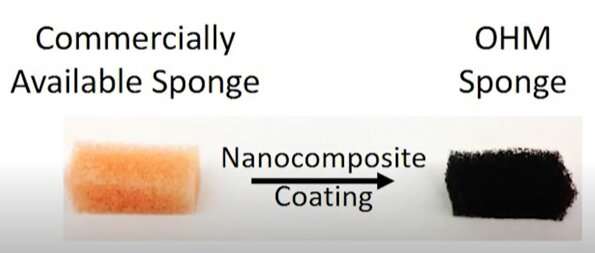Q&A: Researchers develop sponge that can collect oil, phosphates and now microplastics from polluted waters

With a sponge that looks like one you might find in your kitchen, Northwestern University researchers have discovered how to effectively clean up oil, microplastics and phosphate pollution.
This sponge could help clean up oil spills without harming marine life and prevent algae blooms from forming when phosphate builds up to dangerous levels. To recover and reuse dwindling natural resources—like oil and phosphate—the sponge can simply be wrung out.
Northwestern engineer Vinayak Dravid, who developed the new tool, said the novel technology can accommodate multiple functions, much like a Swiss Army knife. The sponge absorbs 99% of phosphate ions it encounters and 30 times its weight in oil.
Dravid is the Abraham Harris Professor of Materials Science and Engineering at Northwestern’s McCormick School of Engineering and the founding director of the Northwestern University Atomic and Nanoscale Characterization Experimental Center (NUANCE).
Vikas Nandwana is a research assistant professor of materials science and engineering at McCormick and co-founder of MFNS Tech, a startup in the process of commercializing oil-absorbing sponges.
In a Northwestern Q&A, the two professors discuss “silent pollution,” the business side of environmental remediation and their sponge-based platform.
What types of pollution can these sponges address?
“Unlike the smokestacks of yesteryears where you can see and feel the pollution in the air, a lot of this pollution is silent,” Dravid said. “This water pollution comes in all kinds, so we want to create a scalable technology which can address remediation.”
How does the sponge work?
“Almost half a billion tons of sponges are wasted each year and go to landfills,” Dravid said. “All we do is coat a tiny amount of nanotechnology slurry and that makes the sponge much more effective in capturing the pollutants. So, what we’re doing is using waste to clean waste.”
“This is just the beginning,” Nandwana said. “Different types of nanotechnology coatings can be made that capture a variety of pollutants not only from water, but also from air and soil. Our sponge surely has potential to revolutionize environmental remediation.”
What are next steps for introducing the platform to the market?
“We have already successfully tested our oil sponge in real-world conditions at a test tank within the National Oil Spill Response Research & Renewable Test Facility, which provides independent and objective performance testing of full-scale oil spill solutions,” Nandwana said.
Smart sponge could clean up oil spills
Citation:
Q&A: Researchers develop sponge that can collect oil, phosphates and now microplastics from polluted waters (2022, April 20)
retrieved 20 April 2022
from https://phys.org/news/2022-04-qa-sponge-oil-phosphates-microplastics.html
This document is subject to copyright. Apart from any fair dealing for the purpose of private study or research, no
part may be reproduced without the written permission. The content is provided for information purposes only.
For all the latest Science News Click Here
For the latest news and updates, follow us on Google News.

